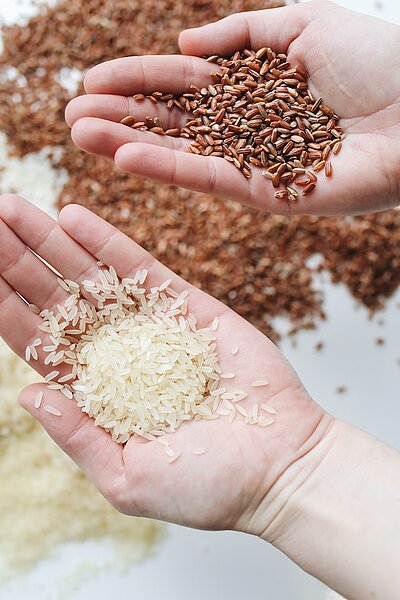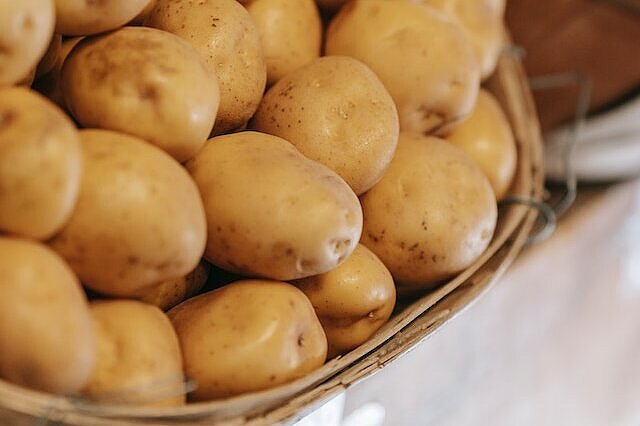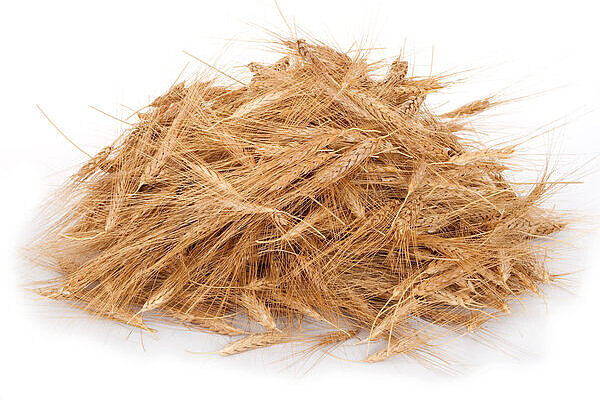Rice starch

Rice starch is a fine, white powder obtained from rice grains. It is often used as a thickener or binding agent in the food industry, but also as a natural alternative to synthetic materials such as plastic or paper. But how does rice starch affect dogs? Is it healthy or harmful for them? Find out everything you need to know about rice starch for dogs in this article.
What is rice starch?
Rice starch is a carbohydrate that results from the breakdown of rice grains. It consists mainly of amylose and amylopectin, two types of molecules that are responsible for the structure and taste of rice. Rice starch has a high water-binding capacity and can therefore thicken or bind liquids. It also has a low allergenicity and is therefore suitable for people and animals with intolerances.
Benefits of rice starch for dogs
Rice starch can have several benefits for dogs, especially if they suffer from certain health problems. Here are some of them:
- Rice starch can help with diarrhea by making the stool firmer and stabilizing the intestinal flora. It can also reduce the absorption of toxins in the intestines and thus speed up recovery.
- Rice starch can help with stomach problems by protecting the stomach lining and regulating acid production. It can also aid digestion and prevent bloating.
- Rice starch can help with diabetes by stabilizing blood sugar levels and increasing insulin sensitivity. It has a low glycemic index and is therefore metabolized more slowly than other carbohydrates.
- Rice starch can help with allergies by acting as a hypoallergenic food and boosting the immune system. It contains no gluten, lactose or other potential allergens.
Disadvantages of rice starch for dogs
Rice starch is not inherently bad for dogs, but there are some disadvantages you should be aware of. Here are some of them:
- Rice starch can lead to obesity if fed in excessive amounts. It has a high calorie content and can therefore contribute to weight gain if not combined with a balanced diet.
- Rice starch can lead to deficiency symptoms if it is used as the sole feed. It contains few vitamins, minerals and trace elements that are important for dogs' health. It should therefore always be supplemented with other sources of nutrients.
- Rice starch can cause digestive problems if it is fed in too large quantities or too quickly. It can lead to constipation, vomiting or abdominal pain if the dog does not tolerate it well or needs to get used to it.
How much rice starch should my dog be given?
The optimal amount of rice starch for your dog depends on various factors, such as his weight, age, health and activity level. However, as a rule of thumb, rice starch should not make up more than 10 to 15 percent of their daily diet. This corresponds to about one to two tablespoons per day for a medium-sized dog.
How do I feed my dog rice starch?
You can feed your dog rice starch in different ways, depending on what he likes and what you have available. Here are some options:
- You can mix rice starch with water and feed it as a porridge or soup. This is especially good if your dog has diarrhea or stomach problems, as it increases hydration and soothes the stomach.
- You can mix rice starch with meat, vegetables or other ingredients and feed it as food or treats. This is especially good if you want to give your dog a varied diet as it improves nutrient absorption and increases flavor.
- You can mix rice starch with eggs, milk or other ingredients and bake it into cakes or cookies. This is particularly good if you want to give your dog a reward, as it strengthens the bond and increases the fun.
Rice starch is a natural and versatile ingredient that is suitable and safe for dogs. It can have some health benefits for dogs, but also some disadvantages that you should be aware of. It should always be fed in moderation and not as a sole food. If you want to feed your dog rice starch, you should always consider his individual needs and get him used to it slowly.
Properties 4
Are you looking for other ingredients with a specific property?
Just click on them to find more.
If you notice any signs of hypersensitivity or poisoning in your dog, you should see your vet immediately. We are not a substitute for a vet, but we try to be as accurate as possible. Every dog reacts differently and we recommend you get a second opinion or consult your vet if in doubt.
Stay healthy and take good care of your four-legged friend!😊
Similar to Rice starch
Corn starch is a carbohydrate obtained from the endosperm of the corn kernel. It is a fine, white powder that is widely used in the food industry - including in dog food. Corn starch is often used...
Potato starch has several benefits for dogs that you should be aware of: Potato starch is gluten-free and therefore suitable for dogs with a grain allergy or intolerance.Potato starch contains...
Tapioca starch is a white, tasteless powder made from the dried and ground roots of the cassava plant. The cassava plant is a tropical plant native to South America, where it is also known as...
Wheat starch consists of over 85 percent carbohydrates. Water makes up around twelve percent. Proteins and fat are only present in minimal proportions. The starch contains around 345 kilocalories...



